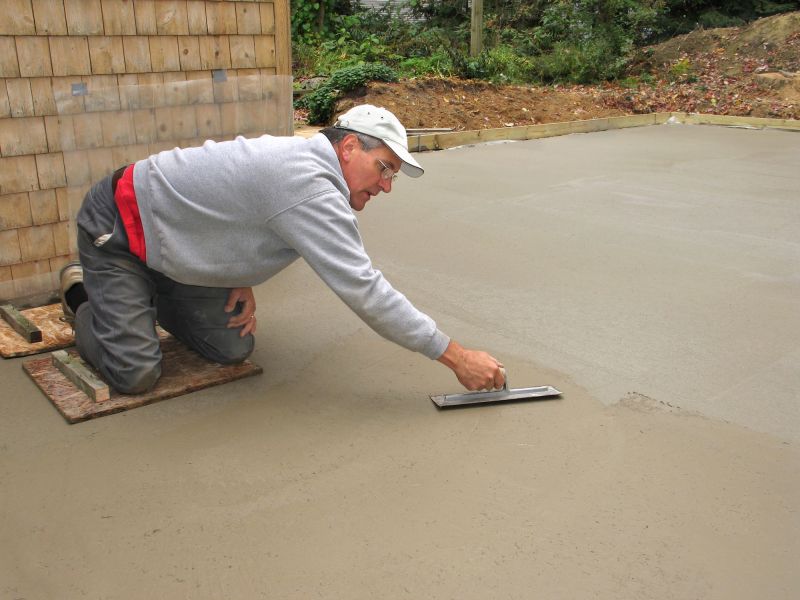Ultimate Guide to Products for Concrete Installation Tasks
Learn about essential products that help streamline your concrete projects and ensure professional-quality results.
 Concrete installations are a fundamental aspect of construction and landscaping projects, providing durable surfaces for driveways, walkways, patios, and foundations. Selecting the right products ensures that concrete structures are stable, long-lasting, and visually appealing. From setting anchors and reinforcing frameworks to finishing surfaces, the array of available products caters to various stages of concrete work. Proper tools and materials can help achieve precise results and minimize issues such as cracking, uneven surfaces, or inadequate support.
Concrete installations are a fundamental aspect of construction and landscaping projects, providing durable surfaces for driveways, walkways, patios, and foundations. Selecting the right products ensures that concrete structures are stable, long-lasting, and visually appealing. From setting anchors and reinforcing frameworks to finishing surfaces, the array of available products caters to various stages of concrete work. Proper tools and materials can help achieve precise results and minimize issues such as cracking, uneven surfaces, or inadequate support.
Top Overall Option
Concrete Reinforcement Mesh
Concrete reinforcement mesh is widely used to enhance the structural integrity of slabs and pavements. It helps distribute loads evenly and minimizes cracking by providing additional support during curing and use. This versatile product is suitable for various concrete projects, from driveways to large commercial slabs, and is available in different gauges and sizes to match specific needs.
Types of Products For Concrete Installations
Reinforcement Mesh
Metal or fiberglass mesh used to strengthen concrete slabs and reduce cracking.
Form Release Agents
Products applied to form molds to ensure smooth concrete surfaces and easy removal.
Concrete Curing Compounds
Liquid or spray-on coatings that help retain moisture during curing for improved strength.
Expansion Joints
Materials used to accommodate movement and prevent cracks in concrete slabs.
Concrete Sealants
Protective coatings that seal the surface against water, stains, and wear.
Formwork Materials
Plywood, metal, or plastic forms used to shape and support poured concrete.
Bonding Agents
Adhesives that improve adhesion between old and new concrete surfaces.
Concrete Vibrators
Tools used to eliminate air pockets and ensure proper compaction of concrete.
Finishers and Trowels
Tools for smoothing and finishing concrete surfaces for a polished look.
Anchors and Fasteners
Hardware used to secure fixtures and structures to concrete surfaces.
Concrete Admixtures
Chemical additives that modify properties like setting time, workability, and durability.
Waterproofing Membranes
Materials applied to concrete to prevent water ingress and damage.
Grout and Mortar Mixes
Specialized mixes used for filling gaps, leveling, or anchoring fixtures.
Surface Texturing Tools
Tools to create patterns or slip-resistant surfaces on cured concrete.
Edge Restraints
Materials that define and protect the edges of concrete slabs.
Popular Choices
A common choice for adding strength to concrete slabs and pavements.
Frequently used to achieve clean form surfaces and ease form removal.
Popular for maintaining moisture during curing, enhancing concrete quality.
Essential for large slabs to manage movement and prevent cracking.
Commonly applied to protect surfaces from stains and wear.
Widely used to ensure proper compaction and eliminate air pockets.
Standard tools for achieving smooth, level surfaces.
Popular for securing fixtures to concrete surfaces securely.
Often used to bond new concrete to existing structures.
Commonly added to modify setting times and improve workability.
Frequently selected to protect below-grade concrete structures.
Popular for creating slip-resistant or decorative finishes.
In Brownsburg, Indiana, professionals and DIY enthusiasts alike prioritize quality when choosing products for concrete applications. Whether installing new concrete slabs or repairing existing ones, understanding the different product types and their specific functions is essential. High-quality additives, formwork materials, and finishing tools contribute significantly to the success of a project. Investing in reliable products can streamline the process, reduce labor time, and improve the overall outcome.
The market offers a wide range of options, from heavy-duty reinforcing mesh to specialized sealants and curing compounds. Each product plays a vital role in the different phases of concrete installation, from preparation and pouring to finishing and maintenance. Careful consideration of the project scope, environmental conditions, and desired longevity can help determine the most suitable products. Proper application and adherence to manufacturer guidelines further enhance the performance of concrete structures.
Ultimately, choosing the right products for concrete installations in Brownsburg involves balancing quality, cost, and compatibility with specific project requirements. Consulting with local suppliers or experts can provide valuable insights tailored to Indiana's climate and construction standards. With the right tools and materials, both professionals and homeowners can achieve durable, functional, and aesthetically pleasing concrete features that stand the test of time.
Key Buying Considerations
- Project scope and size to determine the quantity and type of products needed.
- Compatibility of products with the specific concrete mix and application method.
- Environmental conditions such as temperature and humidity during installation.
- Durability requirements based on the location and expected load or stress.
- Ease of application and availability of tools or accessories required for installation.
- Compatibility with existing structures or surfaces if performing repairs or upgrades.
- Manufacturer specifications and recommended usage instructions.
- Budget constraints balanced with quality and longevity expectations.
- Local building codes and standards that may influence product selection.
- Availability of technical support or guidance from suppliers.
- Safety considerations, including proper handling and protective gear.
- Storage and shelf life of products, especially for long-term projects.
- Environmental factors that could affect curing or setting times.
- Desired aesthetic or surface finish for visible concrete features.
- Maintenance requirements and long-term performance expectations.
